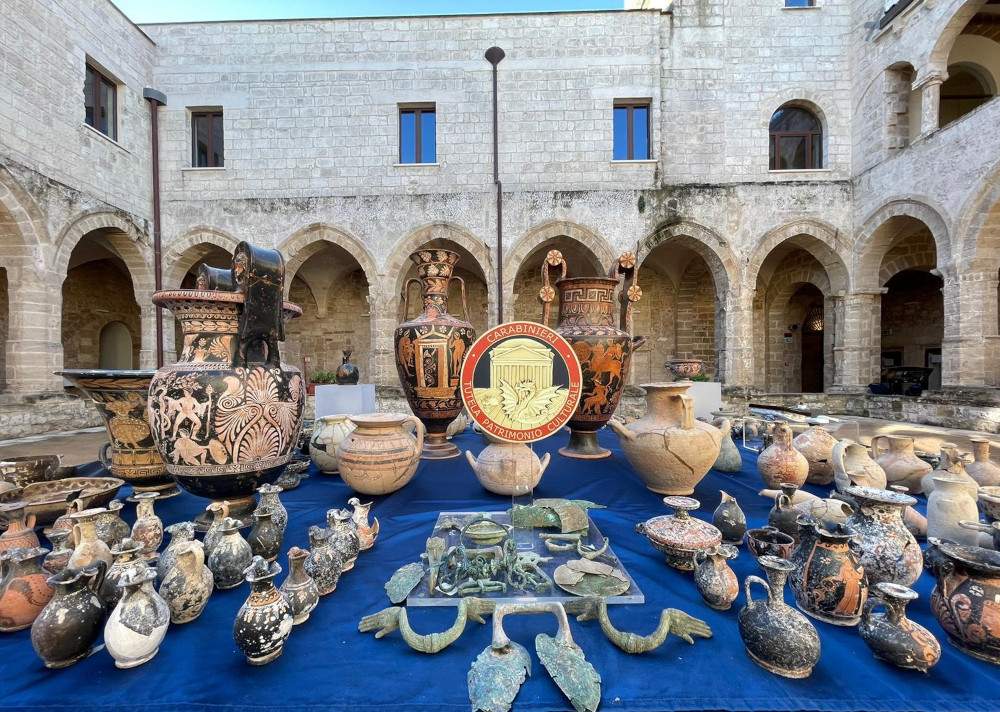More than 2,000 Magna Graecia archaeological finds recovered thanks to Carabinieri investigation launched in 2019
Beginning in February 2019, a complex investigative activity conducted in Italy and abroad by Carabinieri per la Tutela del Patrimonio Culturale and coordinated by the Taranto Public Prosecutor’s Office, called Operation Taras, led to the recovery of more than two thousand Magna Graecia archaeological artifacts, dating back to the period between the sixth and second centuries B.C., including a Hellenistic helmet that has now been returned to Carabinieri TPC.
The investigation was initiated when the Carabinieri discovered that a known suspect in cultural heritage crimes was periodically staying at a hotel in Munich, where he was carrying several packages, containing objects that were likely archaeological in nature. It was thus ascertained that this person would leave by train from Taranto and, crossing Austria, arrive in Munich, where he would stay overnight and then continue his journey, again by train, to Brussels.
The investigation was also developed through the use of thorough technical activities, such as telephone and environmental wiretaps, video recordings, Observation, Control and Tracking (OCP) services in Italy and abroad, and numerous letters rogatory and European Investigation Orders (EIOs) were executed to Germany, Belgium, the Netherlands and Switzerland. A vast illicit trade in archaeological artifacts emerged, conducted by a well-structured criminal syndicate with major connections abroad. The main suspect was arrested in Munich in January 2020 and found in possession of several artifacts of significant historical and archaeological interest. He was then arrested again in November 2021 in Delft, the Netherlands, at which time the Hellenistic helmet now returned was recovered. In June and July 2020, in cooperation with local police, searches were conducted in Belgium and the Netherlands. A home in Brussels turned out to be the support base and storage facility of the individual arrested in Germany: there, about 1,000 archaeological artifacts from Italy, mainly from the area of Taranto and its province, dating from the period between the 6th and 2nd centuries B.C. were seized.
At the same time, other important Italian artifacts from clandestine excavations were identified, marketed in Brussels to dealers in the sector unaware of their illicit provenance, as well as a workshop specializing in the restoration of ancient art objects in Delft, where various archaeological goods had been brought over time for restorations preparatory to their offering on the market.
The identification of these figures led in October 2021 to searches in the province of Taranto at the homes of those involved in various capacities in the illicit trade, and to the seizure of an additional approximately 1,000 artifacts, mainly referable to archaeological areas in Taranto, along with sophisticated metal-detectors and various tools for probing the ground. Thirteen people were charged with criminal conspiracy, receiving stolen goods, clandestine excavation, and unlawful possession of archaeological artifacts.
During the various stages of the investigative activities, numerous clandestine excavations were identified in archaeological areas in Taranto and province, thus locating the probable sites of origin of the seized artifacts.
 |
| More than 2,000 Magna Graecia archaeological finds recovered thanks to Carabinieri investigation launched in 2019 |
Warning: the translation into English of the original Italian article was created using automatic tools. We undertake to review all articles, but we do not guarantee the total absence of inaccuracies in the translation due to the program. You can find the original by clicking on the ITA button. If you find any mistake,please contact us.





























